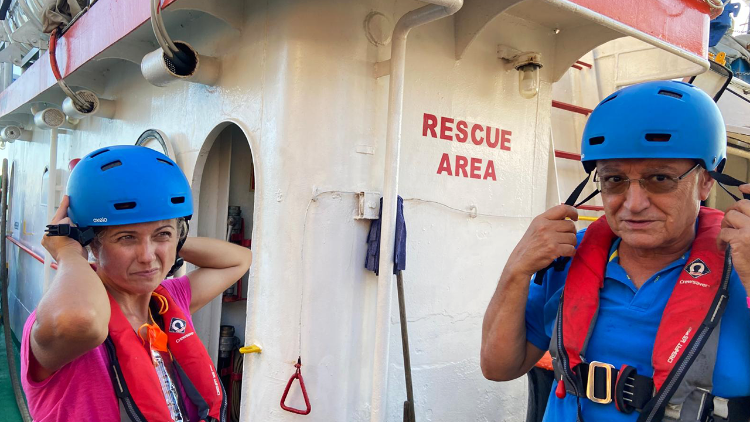
‘A shared love’: Church representatives reflect on migrant rescue operation
By Joseph Tulloch - Trapani
On August 24-25, the Mare Jonio participated in the rescue of 182 migrants in the Mediterranean.
The vessel – which is operated by the humanitarian organisation Mediterranea Saving Humans – was accompanied, for the first time, by a support boat financed by the Italian Bishops’ Migrantes Foundation.
Onboard were Fr. Alessandro Messina, the director of Migrantes for the Diocese of Fano, and Donatella D’Anna, director of Migrantes in the Diocese of Caltanissetta, central Sicily.
Shortly after the support boat returned to land, Vatican News spoke to both directors about their experience and their hopes for further collaboration between Migrantes and Mediterranea.
Joy and suffering
Reflecting back on the past few days, both Ms. D'Anna and Fr. Alessandro – or “Don Sandro”, as he quickly became known by all members of the team – said they feel changed.
Ms. D'Anna works closely with migrants in central Sicily, helping them to find jobs and build a new life. She said she was not surprised by what she saw. “In my job, I hear a lot about their journeys, their struggles to arrive in Italy,” she said.
But, she noted, knowing about something in the abstract and experiencing it firsthand are two very different things—and she was leaving with a real sense of sadness.
Don Sandro said that during the mission he had seen much suffering, but also the happiness in the migrants’ eyes as they were brought to safety on the Mare Jonio.
“That’s something that leaves a mark,” he explained, and his voice broke a little. “That’s something that you take with you.”
Church as ‘witness and spokesperson’
The priest went on to describe how the joint Mediterranea-Migrantes mission was born.
He had met Luca Casarini, the Italian activist and founder of Mediterranea, at an event several months ago, and asked if it might be possible to join one of the organisation’s rescue missions in a personal capacity.
While this proved difficult, it led to the idea of a more official collaboration between the two organisations. Don Sandro’s local branch of Migrantes proposed the idea to the national office, and so the joint operation was born.
The choice to send a support boat along, said Ms. D'Anna, had been made in order for the Church to “see with its own eyes what’s happening in the Mediterranean”, and “be a witness to and a spokesperson for the tragedy that our brothers and sisters are experiencing every day at sea.”
A shared love for humanity
Both Migrantes directors hope that the mission will be only the first step in a deeper collaboration between their organisation and Mediterranea. And they have a vision of what needs to be done.
“As Migrantes, we have a special task”, said Don Sandro. “We have to raise awareness, both within Christian communities and society at large, about the importance of welcome, of building a civilization of love, a civilization where there’s room for everyone.”
For Ms. D'Anna, “we can’t stop at search and rescue or the welcome of migrants to Italy.” What is needed, rather, is to “resolve the problem at the root," which means, she said, a thorough overhaul of the visa system, which convinces many migrants that their only option is to take to sea.
“God created the world for everyone,” concluded Don Sandro. “He created us brothers and sisters, as Pope Francis keeps telling us. On this mission, I’ve had the privilege of sharing this love for humanity with others, with people of other religions, people with no religion at all. Christ is human, and what Jesus teaches me is love for all humankind.”
Journeying back in time
Vatican News also spoke about the rescue operation with Ibrahima Lo, a Mediterranea activist who himself was saved at sea while attempting the journey to Europe back in 2017.
“It was very difficult for me”, he said. “I relived my own journey, and I felt I could see all my friends again, the ones that died in the Mediterranean, in Libya, in the Sahara.” But there were moments of elation, too, he said: the happiness of the faces of the migrants as they were welcomed aboard, the shouts of joy as the women in the second boat realised that they were being rescued.
Ibrahima added he was very grateful to the Italian Church and Pope Francis – whom he called an “example of religion and humanity” – for their support for Mediterranea’s mission. But, he stressed, it is unacceptable that these search and rescue operations are left up to NGOs and institutions like the Church.
“The Italian state has to do something, the EU has to do something. People are dying every day.”
Thank you for reading our article. You can keep up-to-date by subscribing to our daily newsletter. Just click here









